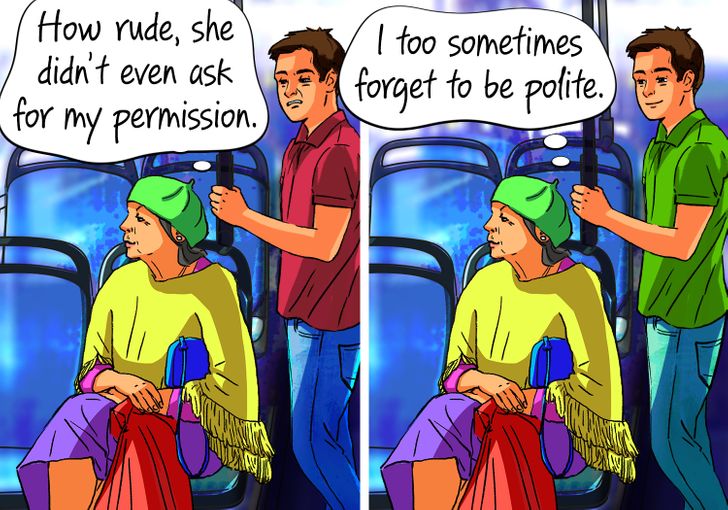11 Tips to Learn How to Be More Tolerant of Others
In our daily lives, we may find ourselves facing situations or people that we find difficult to tolerate because they are, think, or act differently than we do. But it is possible to improve this aspect of our personality by learning to respect and value diversity.
5-Minute Crafts wants to help you to be more tolerant of others through some useful tips that you can put into practice right away.
1. Strive to put yourself in the other person’s shoes

You can learn to put yourself in the other person’s shoes by imagining yourself in their situation. Or you can ask them, with sincere curiosity, about the details of their life to try to understand them better. Doing this will prevent us from questioning others about everything they do.
Empathy helps us understand how the other person feels and be more tolerant of actions or ways of thinking that are different from our own. While some people tend to be empathetic by nature, others have a hard time being empathetic. But with practice and conscious effort, it is possible.
2. Ask for an explanation of the other person’s point of view

A smart way to reverse a negative situation and show tolerance is to ask the other person to state his or her opinion, perhaps by saying, “Tell me more about what you think. Why did you come up with that idea?”
On the contrary, intolerance can lead us to defend our ideas in an offensive way, closing off any possibility of coming to understand the other person.
3. Don’t personalize the conversation

When we are talking to someone and we find it difficult to be polite, what we shouldn’t do is personalize the conversation by accusing the other person for having a different opinion.
One way to do this is to use first person sentences. For example: “I don’t agree with that. I think that...”. On the other hand, if we start by saying: “You’re wrong for thinking that way. Your opinion is wrong,” what we get is a negative discussion.
4. Spend some time learning about other people and cultures

Our tolerance level can increase when we learn about a culture and the idiosyncrasies, beliefs, and traditions of the people we may have to deal with. This doesn’t mean denying one’s own culture, but enriching it by learning about the diversity that surrounds us.
5. Set aside differences by changing the subject

We are all different and think differently. This doesn’t have to mean conflict. Rather, to get through a difficult situation and continue to be tolerant, it is possible to put aside those differences by changing the topic of conversation or avoiding those that could generate controversy.
Sometimes it is not a matter of changing their minds or modifying our opinions on certain issues. Rather, it is about accepting that we may agree or disagree with others and that we aren’t going to make friends with everyone we interact with.
6. Listen carefully to others without jumping to conclusions

Listening is useful in many areas of life and most of us do it every day. Except that we have to keep in mind that we should listen not to respond, but to understand and respect the other. Certain research has determined that receptive listening is essential for the proper functioning of human relationships.
To achieve this, it is important to not interrupt, to look the other person in the eye, and to not jump to conclusions. If the other person starts talking and we immediately begin to judge and react emotionally, while thinking about the answer we are going to give, we will be impeding communication.
7. Remember that you have the power to change your negative emotions into positive ones

When we face a conflict that we find difficult to tolerate, it is good to remember that we are masters of ourselves and our emotions. Just as the other person owns themselves and their opinions and may not even be aware of what we are feeling.
8. Change the perspective of a situation and turn it toward yourself

Sometimes we may not be able to understand exactly why others act in a certain way. This can cause us to lose perspective when we interact with them.
To solve this and remain tolerant, we can change our criteria and turn it back on ourselves. Then, instead of thinking, “That person was very rude to me,” we can think, “Maybe I’m going through a difficult time. I say things without thinking when I’m not doing well.”
9. Practice respect for the opinions of others without taking them personally

Respecting others implies believing that they have the same rights as we do. It means recognizing their differences, accepting and valuing them, and not judging them.
We can increase our respect for the opinions of others by not taking them personally. Even if we embrace the ideals of a group, that doesn’t mean we are enemies of those who don’t. Nor can we expect everyone to agree with us. But if we learn to respect differences, we will understand that even if we disagree, all ways of thinking can be equally valid.
10. Be mentally prepared to change your mind if necessary

It may happen that, during a conversation, we realize that, in truth, we are not right. When we accept this and do not insist on our wrong opinion, we are not only being tolerant but also humble. Exercising this aspect of our personality can be difficult, but it helps us to be more open toward others.
11. Analyze the reasons that may lead you to be intolerant

The first step to becoming more tolerant is to analyze why we aren’t. Family background or past experiences may have influenced the way we see things. If we believe we are always right, we should dig deep inside ourselves to find out if we are right, or if we may be wrong.
Doing this requires a lot of patience, especially when situations arise that bother us. For example, if we are sent a text message full of spelling mistakes, instead of reacting immediately, we can count to 10 and realize with a calm mind that the person is probably not doing it on purpose to make us angry.